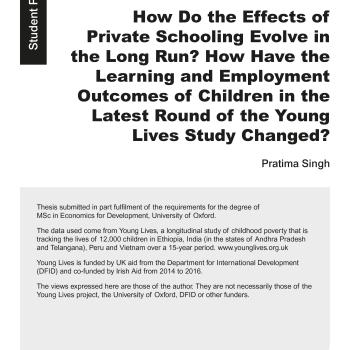Publication Information

In this study the authors seeks to identify the presence and extent of a private school premium on the cognitive skills, higher studies outcomes and psychosocial skills of children.
Using a value added dynamic OLS model,the author tests for said premium for the younger cohort (aged 12 years), on the basis of their current and previous rounds’ scores for Mathematics, English and the PPVT test. The author finds that private school premium for rural areas is significant for Mathematics and English. In urban areas the premium is significant for the Mathematics and PPVT tests. The magnitude of this premium has changed compared to previous studies. These differences can either be seen as a change in the way the premium for different subjects evolves as children grow older, or, as a result of more robust estimation and richer data. For the older cohort (aged 19 years), I seek to identify the effect of attending private school in the previous round (2010) on their higher-education outcomes in the most recent round (2013). Using the linear probability model of discrete choice I find significant positive average effects of private schooling on the probability of the children attending XIIth grade, the highest grade in secondary school, and the probability of attending post-school education – vocational, technical or degree level. Finally, the author looks at the impact of private schooling on the psychosocial skills of both the cohorts. The author doesn't find any significant impact for the younger cohort. The older cohort however, displays a significant private school premium on the agency and sense of belongingness indices. This might suggest that psychosocial skills develop later in life than cognitive skills. Therefore, even though the author does not find any evidence of inequalities in this regard when the children are younger, these might grow to be significant as they enter adulthood.

In this study the authors seeks to identify the presence and extent of a private school premium on the cognitive skills, higher studies outcomes and psychosocial skills of children.
Using a value added dynamic OLS model,the author tests for said premium for the younger cohort (aged 12 years), on the basis of their current and previous rounds’ scores for Mathematics, English and the PPVT test. The author finds that private school premium for rural areas is significant for Mathematics and English. In urban areas the premium is significant for the Mathematics and PPVT tests. The magnitude of this premium has changed compared to previous studies. These differences can either be seen as a change in the way the premium for different subjects evolves as children grow older, or, as a result of more robust estimation and richer data. For the older cohort (aged 19 years), I seek to identify the effect of attending private school in the previous round (2010) on their higher-education outcomes in the most recent round (2013). Using the linear probability model of discrete choice I find significant positive average effects of private schooling on the probability of the children attending XIIth grade, the highest grade in secondary school, and the probability of attending post-school education – vocational, technical or degree level. Finally, the author looks at the impact of private schooling on the psychosocial skills of both the cohorts. The author doesn't find any significant impact for the younger cohort. The older cohort however, displays a significant private school premium on the agency and sense of belongingness indices. This might suggest that psychosocial skills develop later in life than cognitive skills. Therefore, even though the author does not find any evidence of inequalities in this regard when the children are younger, these might grow to be significant as they enter adulthood.

